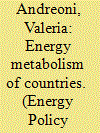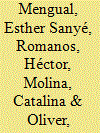|
|
|
Sort Order |
|
|
|
Items / Page
|
|
|
|
|
|
|
| Srl | Item |
| 1 |
ID:
092784


|
|
|
|
|
| Publication |
2009.
|
| Summary/Abstract |
This paper applies the so-called Multi-Scale Integrated Analysis of Societal and Ecosystem Metabolism (MuSIASEM), based on Georgescu-Roegen's fund-flow model, to the Spanish region of Catalonia. It arrives to the conclusion that within the context of the end of cheap oil, the current development model of the Catalan economy, based on the growth of low-productivity sectors such as services and construction, must be changed. The change is needed not only because of the increasing scarcity of affordable energy and the increasing environmental impact of present development, but also because of the aging population. Moreover, the situation experienced by Catalonia is similar to that of other European countries and many other developed countries. This implies that we can expect a wave of major structural changes in the economy of developed countries worldwide. To make things more challenging, according to current trends, the energy intensity and exosomatic energy metabolism of Catalonia will keep increasing in the near future. To avoid a reduction in the standard of living of Catalans due to a reduction in the available energy it is important that the Government of Catalonia implement major adjustments and conservation efforts in both the household and paid-work sectors.
|
|
|
|
|
|
|
|
|
|
|
|
|
|
|
|
| 2 |
ID:
176674


|
|
|
|
|
| Summary/Abstract |
This paper discusses how the deceleration of economic growth, that followed the financial crisis of 2008, influenced the energy efficiency, allocation and use of 18 European countries. By using a Multi-scale Integrated Analysis of Societal and Ecosystem Metabolism (MuSIASEM), the relationships between energy requirements, economic trends and population are investigated for the years 2008 and 2015. The analyses are performed for the entire society (Level N), for the household and the paid sectors (Level N-1) and for the agricultural, the industrial and the service activities (Level N-2). Results show that two main groups of countries performed the largest energy reductions, namely: the country most affected by the global financial crisis, such as Greece, Romania and Spain, where the total energy throughput decreased by −19.6%, −15.8% and −12.1%, respectively; and the countries, such as Ireland and United Kingdom, that experienced the largest energy intensity reductions (−38.7% and −19.2%), together with the highest GDP increases (+44.8% and +10.2%). By providing an overview of the relationships existing between socio-economic and energy variables, this paper contributes to the debate around growth and efficiency and can support the design of policies oriented to promote the achievement of a more sustainable and competitive economy.
|
|
|
|
|
|
|
|
|
|
|
|
|
|
|
|
| 3 |
ID:
127239


|
|
Environmental and self-sufficiency assessment of the energy met: the case of Menorca (Spain)
/ Mengual, Esther Sanyé; Romanos, Héctor; Molina, Catalina; Oliver, Antònia M, Ruiz, Núria, Pérez, Marta , Carreras, David, Boada, Martí, Orellana, Jordi Garcia, Duch, Jordi, Rieradevall, Joan
|

|
|
|
|
| Publication |
2014.
|
| Summary/Abstract |
Energy performance of island tourism has been analyzed in the literature. However, tourist services tend to concentrate in tourist hubs, especially where mass tourism predominates (e.g., Mediterranean), and the energy metabolism of these systems has not yet been assessed. The present paper models and estimates the energy metabolism of tourist hubs in the Menorca Island (Spain) by integrating social, geographical and environmental methods. Mobility (both external and internal) and consumption of lodging services were characterized through surveys to users (tourists) and business managers. An environmental assessment evaluated CO2 emissions, and energy self-sufficiency potential was estimated via GIS data. The results indicate that, on average, a tourist consumes 4756 MJ with associated emissions of 277 kg of CO2 per stay (20 days on average). Of all the energy flows, external mobility contributes the most to total emissions (77%). For every day spent in a tourist hub, a tourist consumes between 29 MJ and 93 MJ in lodging services, consumption that could be 100% satisfied by photovoltaic systems, and these systems would result in positive effects for the island. Sustainable tourism management might focus on promoting environmentally friendly transportation, energy efficient practices, and environmental communication through ecolabeling.
|
|
|
|
|
|
|
|
|
|
|
|
|
|
|
|
|
|
|
|
|